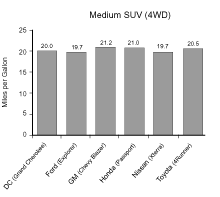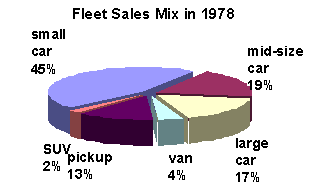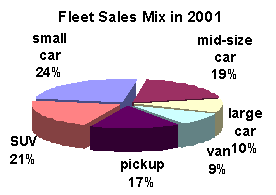backgrounder
Fuel Economy and Consumer Choice Today
 Consumers have more choices today in the shape,
size, and color of the car or truck they purchase than ever
beforeŚchoices that exist under current fuel economy
standards. Requiring the auto industry to meet higher fuel economy
standards across all vehicle types
will expand consumer choice, no longer limiting consumers to
smaller, no-frills cars if they want to get more than 30 miles to
the gallon. Currently, there is virtually no choice
available to consumers if they choose to purchase an SUV or other
larger vehicle. Detroit has the technology to improve the fuel
economy of all passenger vehicles, but has opted to focus
on increasing size and power instead of gas mileage. Higher
fuel economy standards would mean that consumers could choose to
save fuel and own an SUV, minivan, pickup truck, or family
car without sacrificing the power and performance they
currently enjoy. Consumers have more choices today in the shape,
size, and color of the car or truck they purchase than ever
beforeŚchoices that exist under current fuel economy
standards. Requiring the auto industry to meet higher fuel economy
standards across all vehicle types
will expand consumer choice, no longer limiting consumers to
smaller, no-frills cars if they want to get more than 30 miles to
the gallon. Currently, there is virtually no choice
available to consumers if they choose to purchase an SUV or other
larger vehicle. Detroit has the technology to improve the fuel
economy of all passenger vehicles, but has opted to focus
on increasing size and power instead of gas mileage. Higher
fuel economy standards would mean that consumers could choose to
save fuel and own an SUV, minivan, pickup truck, or family
car without sacrificing the power and performance they
currently enjoy.
History demonstrates that higher fuel economy does
not limit vehicle choice. There are currently more than 400
vehicle nameplates (nameplates are a combination of models; for
example, the Ford Taurus nameplate includes the Ford Taurus LX, SE,
SES, and SEL models) available from the approximately 22 passenger
vehicle manufacturers selling cars and trucks in the United States
today. This includes 237 passenger car nameplates and 171 light-duty
truck nameplates. By comparison, there were fewer than 300
nameplates available in 1978, the year fuel economy standards first
went into effect.
 |
 |
In addition to a wide variety of nameplates, consumers
can make a broader set of purchase decisions today than they did in
1978. When fuel economy standards went into effect, small cars
dominated the market; today, SUVs and small cars combined have the
same market share once held by small cars alone. Improving fuel
economy would increase the number of options available to today's
consumer. But the fuel economy performance of SUVs and other
light trucks is not likely to improve without government action that
requires the industry to provide more fuel-efficient options in that
vehicle category.
|







